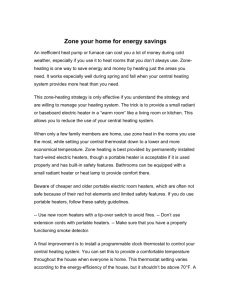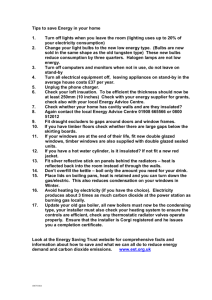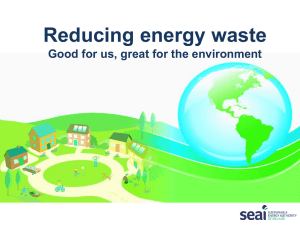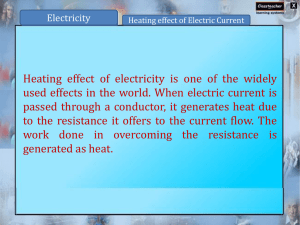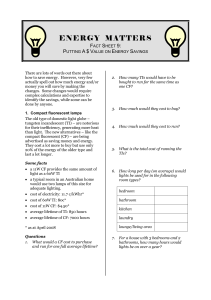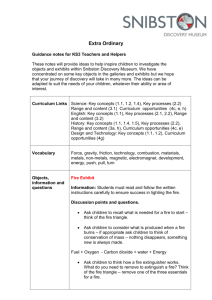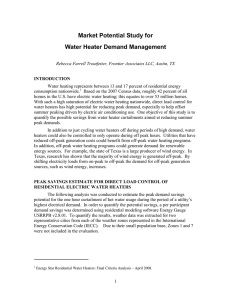Energy Advice (Coldline Fact Sheet 5)
advertisement
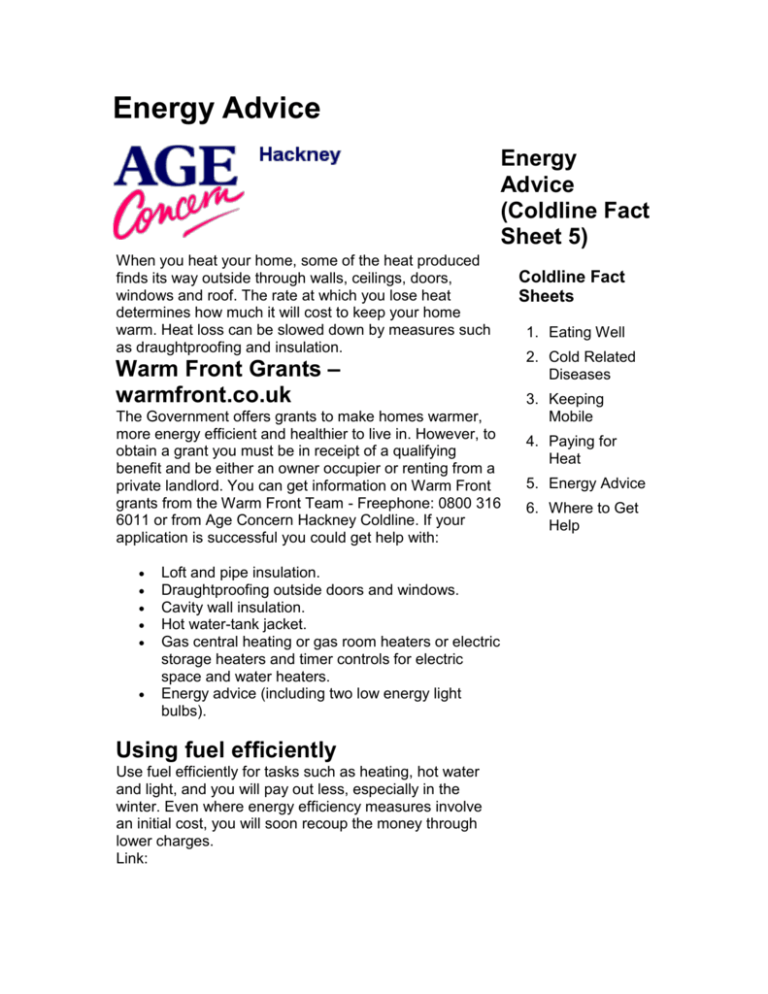
Energy Advice Energy Advice (Coldline Fact Sheet 5) When you heat your home, some of the heat produced finds its way outside through walls, ceilings, doors, windows and roof. The rate at which you lose heat determines how much it will cost to keep your home warm. Heat loss can be slowed down by measures such as draughtproofing and insulation. Warm Front Grants – warmfront.co.uk The Government offers grants to make homes warmer, more energy efficient and healthier to live in. However, to obtain a grant you must be in receipt of a qualifying benefit and be either an owner occupier or renting from a private landlord. You can get information on Warm Front grants from the Warm Front Team - Freephone: 0800 316 6011 or from Age Concern Hackney Coldline. If your application is successful you could get help with: Loft and pipe insulation. Draughtproofing outside doors and windows. Cavity wall insulation. Hot water-tank jacket. Gas central heating or gas room heaters or electric storage heaters and timer controls for electric space and water heaters. Energy advice (including two low energy light bulbs). Using fuel efficiently Use fuel efficiently for tasks such as heating, hot water and light, and you will pay out less, especially in the winter. Even where energy efficiency measures involve an initial cost, you will soon recoup the money through lower charges. Link: Coldline Fact Sheets 1. Eating Well 2. Cold Related Diseases 3. Keeping Mobile 4. Paying for Heat 5. Energy Advice 6. Where to Get Help Switching your Gas and Electricity suppliers You can make savings on your gas and electricity by switching your supplier. There are also social tariffs that fuel providers can help with. However, if you are thinking about changing your supplier you should get advice first. Consumer Focus has lists of accredited comparison websites. Consumer Direct has advice on changing supplier 08454 04 05 06 or contact Age Concern Hackney Coldline. Appliance labeling Energy efficient appliances use less electricity and cost less to run, so when buying an appliance it is important to look for the energy label. ‘A’ is the most energy efficient and will use up to half the electricity of a similar ‘G’ rated model. The amount of electricity consumed also depends on how the appliance is used (how full a fridge or freezer is, for example) and where it is located. A cold appliance, such as a fridge, will use more electricity if it is sited near a cooker or heater. Priority Service Register If you are a domestic consumer and are of pensionable age, or have a disability, a long term illness, blind or have visual impairment you can choose from a selection of free services that are designed to make your life easier please consult Consumer Focus and Consumer Direct 08454 040506 to find out what your fuel supplier can do. You can register yourself on the Priority Service of your gas and electricity company by calling them direct. Gas If you have a gas supply, gas should be your cheapest option for heating, cooking and hot water. In your living room, for example, a gas fire is cheaper than an electric heater, open coal fire or bottled gas heater. Gas wall convector heaters have the lowest running costs of any kind of heater. Many people regard gas central heating as expensive to use, whereas it is a very efficient type of heating and is easy to control. On your central heating system you should have a programmer (or time switch), a room thermostat and a hot water cylinder thermostat. You may also have Thermostatic radiator valves to control the heat on individual radiators. Try to ensure you use your heating controls efficiently; otherwise running costs can be high. You can get advice on this from Age Concern Hackney Coldline - 0207 241 2299 or, if you live in council or housing association property from your Estate Manager. It is very important that all gas appliances are serviced annually to ensure that they are running safely and efficiently. Gas safety checks should always be carried out by a qualified registered gas installer. If you are a tenant, your landlord is legally required to arrange a gas safety check on a yearly basis. If you are an owner/occupier or live in private rented property you can consult GasSafeRegister 0800 408 5500 or www.GasSafetyRegister.co.uk. For gas emergency 0800 111 999 It is also important that chimneys are swept regularly (at least once a year is recommended). For chimney sweeping advice call either Age Concern Hackney Coldline or the Chimney Sweeps in London from refresh services on 0845 1080987 www refreshservices.com Electricity Electricity companies offer both standard and off-peak tariffs. If you use electricity to heat your home, off-peak tariffs (such as Economy 7), will help you reduce your bills. Fan heaters or bar fires using full price electricity are the most expensive form of heating. Storage heaters using off-peak electricity are the cheapest form of electric heating – they are almost as cheap as gas. Solid fuel Open fires make poor use of fuel. They are among the most expensive forms of heating, unless they have a back boiler. An enclosed solid fuel heater, although expensive to install, will make better use of the fuel. Use of bottled gas appliances Many people believe bottled gas to be an economic method of heating but it is, in fact, one of the most expensive fuels. When using a bottled gas or paraffin heater you must open the windows slightly to allow for some ventilation, as these appliances give off fumes and water vapour. This needs to escape, otherwise poisonous fumes and condensation will build up in the room. When purchasing a new bottled gas appliance it is important to check to see the British Standard Label. This means the heater will be fitted with a special safety devise that cuts off the gas supply if the room gets too stuffy. Electric water heating If you use electricity to heat your hot water you should be on an off-peak tariff If your home is not wired for off-peak electricity do not leave the immersion heater on all day, as this is very expensive. Heat up the water for an hour or two, just before you need it. If you can afford to have a time switch fitted to your immersion heater you will save money, as you will be able to control when it comes on and off. Ensure that your immersion tank is adequately insulated and the thermostat is set to 60º C. Money saving tips You will find some ideas in your ‘Keep Warm, Keep Well’ booklet; or look on the government website www direct.gov.uk/ keepwarmkeepwell Here are some other suggestions. Use a low setting cycle on your washing machine will reduce the amount of electricity it uses. Use a low setting for a long time rather than a high setting for a short time when using your heating. It is cheaper and you will be more comfortable. Draw the curtains when it gets dark but make sure they do not hang in front of radiators. Avoid putting furniture in front of radiators or heaters as this will reduce the heat given out. Turn off heating in rooms that are not being used for long periods and close the door. When using a kettle ensure you only put in enough water for what you need. If you are unsure about any of the advice contained it this fact sheet, contact Age Concern Hackney Coldline - Tel: 020 7241 2299 and ask for one of its trained energy advisors to help you. Registered charity 1061633 / Registered company 3346199
